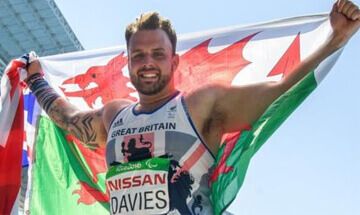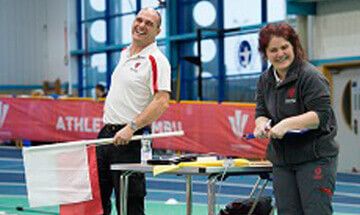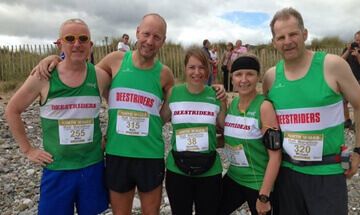
Iwan Thomas
Iwan Thomas
After a remarkable career winning Commonwealth and European titles, Iwan retired in 2006, only to discover two years later that he was a world champion as well!
This came about because Antonio Pettigrew, a member of the USA’s gold medal winning team in the 1997 World Championships in Athens admitted in 2003 that he had taken illegal substances and as a result all of his performances between 1997 and 2003 were declared void by the IAAF. This meant that the British squad of Thomas, Roger Black, Mark Richardson, and fellow Welshman Jamie Baulch belatedly became world champions after an eleven year gap.
The retrospective gold was just reward for Iwan who during his career, won eleven major medals including two European gold’s and the Commonwealth title in 1998, which was undoubtedly his best year when he was amongst the world’s elite one lap runners.
His British 400m record of 44.36 set when taking the UK title in 1997, clipped one-hundredth off Roger Black’s record, and remarkably this time still stands today (2013) as the UK (and Welsh) record. The only British athlete to get close to this time in the current millennium is fellow Welshman Tim Benjamin who ran 44.56 in 2005.
But athletics was not his first sporting love. Born in Farnborough, Kent, Iwan Gwyn Thomas started BMX bike racing around the age of eight and within two years he became East Anglia champion and retained that title until he switched to athletics nine years later. He was always in the top three or four BMX racers in the UK, finishing second in the national championships in his first year and during this time he represented his country in two world championships, at Orlando in 1985 (fourth) and Brisbane in 1989 (ninth). He also took fourth place in the European Championships in Holland in 1987. During his seven-year biking career he managed to win over 400 trophies.
When Iwan’s father moved to Germany to take up a NATO appointment, he moved in as a boarder at Stamford School to study for his A-levels. This signalled the end of his BMX career and instead he took up rugby and athletics. The rest is history! His rugby skills were so advanced that he even managed to reach the final trials for England Schools Championships.
At the age of sixteen he decided to take on five track and field events at the school sports day. He managed to win the 100, 200, 400, long jump and high jump and broke the school record in every event. It was then that Iwan started to realise that maybe he was destined to become a runner. He started taking athletics seriously in 1992 and made the British team for the World Junior Championships in Seoul, helping them to fifth in the 4 x 400 relay.
He first appeared in the Welsh Champs in 1993 when he finished second to Gareth Davies in 48.04, but turned the tables on the Sale Harrier the following year when he took the first of his three titles.
While at West London Institute studying a BSc (Honours) degree in Sports Studies and Leisure Management he got into top-level athletics when he joined Newham and Essex Beagles. He was introduced to Roger Black’s coach Mike Smith and soon Mike became his mentor.
He set the first of his ten Welsh records with 46.34 in 1994 and then improved to 45.98 in the Commonwealth Games at Victoria where he reached the semi-finals of the individual 400m before helping Wales to seventh spot in the 4 x 400m final.
Iwan made further progress to 45.58 in 1995, when he made the British 4 x 400 team that won the European Cup in France. But 1996 was the year that he broke into world class. At the Atlanta Olympics he finished fifth in the final won by his great rival Michael Johnson. His time of 44.70 was another Welsh record and along with fellow Welshman Jamie Baulch, he collected a silver medal in the relay.
Atlanta gave him the springboard to achieve greater things over the following two years. At the 1997 UK championships at Birmingham he claimed Roger Black’s British record with a superb run in 44.36, which still stands. This set him up for the Athens World Championships where he finished a disappointing sixth in the individual 400m before winning the silver medal in the relay which eventually turned to gold a decade later.
But 1998 was undoubtedly the highlight of his career as his performances are unlikely to be challenged for a long time. In July he beat the cream of the British one-lap runners at the AAA’s championships to with an impressive 44.50 – just short of his UK record set the previous year. And what followed in a remarkable 29-day period is now Welsh athletics folklore - four gold medals at major world athletics championships - Kuala Lumpur Commonwealth Games, Budapest European Championships and World Cup in Johannesburg; plus a silver and bronze relay medal. Not surprisingly he was voted BBC Wales Sports Personality of the Year – the first athlete for five years (since Colin Jackson) to win the coveted award.
However from the highs of 1998 his career nose-dived in 1999. His whole future was put in doubt due to the development of a cyst on his ankle. He also sustained a stress fracture in South Africa during winter training and eventually had to have keyhole surgery. His only consolation during the year was his MBE award for services to athletics.
2000 saw him struck down yet again with injury and poor form. He had his first race since the Kuala Lumpur Commonwealth Games when he ran in a low-key event in Budapest and was encouraged with his 45.85 clocking, improving to 45.82 in a race in Sweden. He missed the 2000 Olympic Trials and controversially did not get the third individual spot in the team although he did run in each round of the relay in Sydney with a leg of 45.2 in the final in which Britain finished sixth.
He bounced back in 2001 to be ranked second in the UK in Peter Matthews’ UK authoritative merit rankings with 45.70, but he recognised that his best days were over, managing just 46.48 in 2002 after further injury and illness.
2002 was Commonwealth Games year, and spurred on by the possibility of a relay medal in the 4 x 400m he wanted to have one final fling having declined the opportunity to defend his individual title. Wales had an outstanding squad of 400m runners for the Manchester Games, including current AAA Champion Tim Benjamin, former world indoor 400m champion Jamie Baulch and the outstanding 400m hurdler Matt Elias who had won the silver in the 400m Hurdles just days before the 4 x 400 final.
As it turned out the relay was an epic which was only settled by the photo-finish camera with the Welsh squad having to settle with the silver medals by just one hundredth of a second. Tim Benjamin ran a solid first leg with a 45.8 split before handing over to Iwan who kept the team in contention with 46.0. Jamie Baulch ran a brilliant third leg of 44.5 to give final leg runner Matt Elias, a great chance of getting the gold. Despite running the fastest split of the race (44.2) England’s Danny Caines just held the Welshman off to win in 3:00.40. The Welsh squad had to be content with a new Welsh record of 3:00.41, 1.45 secs better than their Kuala Lumpur performance where they took the bronze.
He was yet again injured in 2003 with damage to his Achilles, but still was good enough to clock his fastest time since his glory year of 1998 with 45.58 in Florence which was the third fastest by a Briton that year.
Further injury in 2004 ruled him out of the 2004 Olympic Games, although he did clock 46.12 to win in Spain in July. But now aged 32, he was selected in 2006 for the Welsh team for the Commonwealth Games in Melbourne, Australia, but was unable to compete due to his injuries and this brought his outstanding career to a close.
Since retirement, he has become a media personality. He was one of the Channel 4 presenters for the London Paralympics and has appeared in a variety of TV shows including being a regular contributor to BBC’s The One Show. He is also the infield interviewer at the major athletics meetings in the UK.
He was inducted into the Welsh Athletics Hall of fame in 2008.
Major medals Won:
|
Gold medals |
European Cup, Villeneuve d’ Ascq |
4 x 400m |
1995 |
|
|
European Cup, Munich |
4 x 400m |
1997 |
|
|
World Championships, Athens |
4 x 400m |
1997 |
|
|
European Championships, Budapest |
400m |
1998 |
|
|
European Championships, Budapest |
4 x 400m |
1998 |
|
|
Commonwealth Games, Kuala Lumpur |
400m |
1998 |
|
|
World Cup, Johannesburg |
400m |
1998 |
|
Silver medals |
Olympic Games, Atlanta |
4 x 400m |
1996 |
|
|
World Cup, Johannesburg |
4 x 400m |
1998 |
|
|
Commonwealth Games, Manchester |
4 x 400m |
2002 |
|
Bronze medals |
Commonwealth Games, Kuala Lumpur |
4 x 400m |
1998 |
Mike Walters and Clive Williams, 2013
(Adapted from The History of Welsh Athletics by John Collins, Alan and Brenda Currie, Mike Walters, and Clive Williams, published in 2002)
Featured links
Useful pages within this section you may like to consider visiting.


